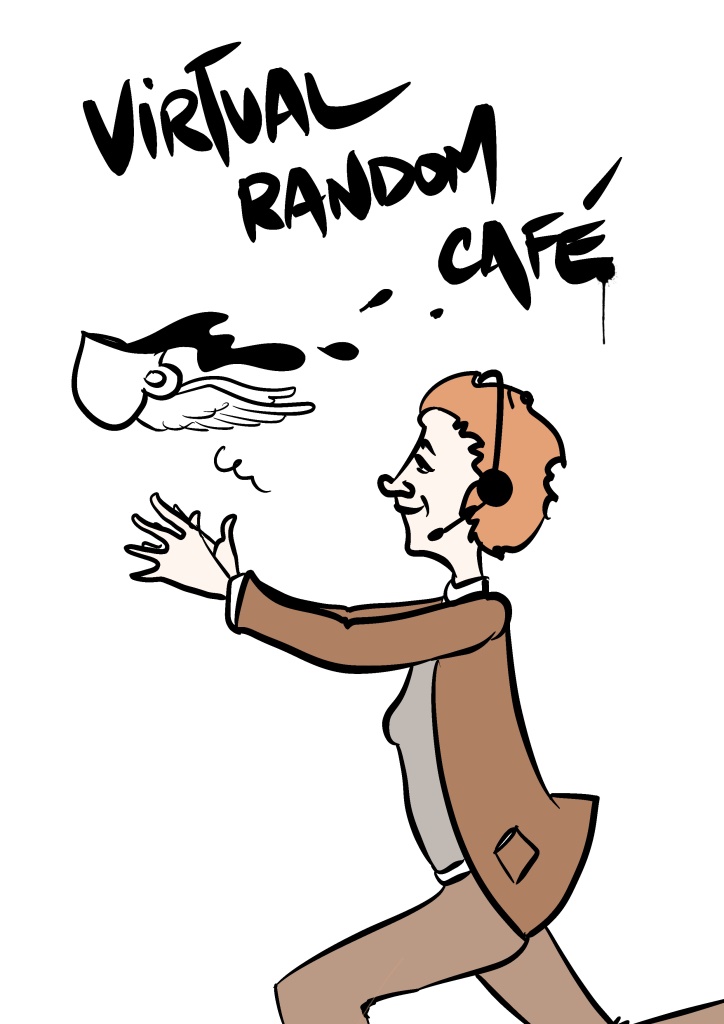This story about the Virtual Random Café was written by Obhi Chatterjee – Head of Sector – Learning Technologies in the European Commission in Belgium. The Virtual Random Café is a simple way to make space for the informal, random 1-to-1 conversations we used to have in corridors, lifts, cafeterias, bars, and cafés before Covid.
Once upon a time, not so long ago, we used to bump into people we knew and stop for a quick chat. These random, informal, 1-to-1 conversations used to happen in streets, in shops, in corridors, in lifts, in office cafeterias and canteens, in bars, and in cafés. Sometimes, they would lead to follow-up conversations, introductions, networking, and collaboration.
Lately, due to Covid-19 measures introduced to limit human contact, there has been no space for these conversations. Instead, many people all over the world have been working from home, perhaps living on their own, with consecutive, work-related video meetings being their only opportunity for conversation. After a day of such online meetings, the prospect of yet another virtual encounter may not sound very appealing.

A general problem with online meetings is that they tend to involve more than the 4 or 5 people who could contribute to a fruitful conversation. Instead, all the attendees are expected to stay engaged throughout the meeting, even if they have limited opportunities to speak. In an online environment, their attention is inevitably distracted by notifications popping up on their screens.
Just as the lockdown started, I learned about the “random cafeteria” concept, which was being launched by a department of the European Commission, which is spread over six sites. Their aim was to encourage staff at different sites to get to know each other.
Those who signed up each week were paired up at random. If they worked at the same site, they would meet in the site cafeteria. If not, they would have a video call.
The staff of the EU Institutions, bodies and agencies, are spread all over the world, just like a multinational organisation.
With everyone working from home, it occurred to me that we could organise virtual random cafeteria sessions in a similar way to the ‘speed networking’ rounds we use in online knowledge café workshops. They use the Zoom breakout room feature, which can assign people randomly to breakout rooms for a preset time and display a countdown to those in each breakout room. The positive feedback from learning & development colleagues at various EU Institutions and agencies with whom I tested the idea encouraged me to take the idea further.
Together with Miruna Stamate, after experimenting with different durations, we found that the optimal combination was to make each session of the virtual random cafeteria 30 minutes long, to include two 10-minute rounds of discussion in pairs. For each discussion round, we provide a question (which is only intended to offer a way for each pair to start the conversation).
As the design is quite simple to manage, each 30-minute virtual random café session could be handled by a single host, who would also be the technical host. We developed the design using Zoom, although it may be possible to run virtual random café sessions using other platforms which can handle breakout rooms smoothly. You can download a copy of the design template here and insert the start time of your session and the name of the host.
The only limits to the number of people who could join a virtual random café session come from the licence limit and the maximum number of breakout rooms. For example, as our Zoom licenses have a maximum of 100 breakout rooms, this is the maximum number of pairs we could accommodate in a virtual random café session – i.e., 200 participants (even though our licence limit is higher than this). The usual maximum number of breakout rooms for paid Zoom accounts is 50.
The question for each conversation round could be as simple as inviting the participants to find one thing they have in common with the other person in their breakout room. For more variety, especially when people keep returning to successive sessions of the virtual random café, we have been using this list of 200 icebreaker questions.
The virtual random café sessions for staff of the EU Institutions have been running daily since November 2020, apart from breaks for public holiday periods. After being promoted initially by the internal communications and well-being teams, they have become more widely known through word-of-mouth publicity. Some colleagues take the opportunity to join the sessions whenever they can fit it in with their other commitments.
Obhi Chatterjee
Head of Sector – Learning Technologies
European Commission, Belgium
May 2021
As meetings seem set to become either completely or partly virtual from now on, the virtual random café offers a simple way to create a safe space for the informal, random, 1-to-1 conversations which might otherwise be missing.
Posts that link to this post
- Randomised Coffee Trials It is just a coffee, but at the same time it is much more
POST NAVIGATION
CHAPTER NAVIGATION
Tags: European Commission (11) | Obhi Chatterjee (4) | speed conversation (3) | speed networking (2) | Zoom (11)
SEARCH
Blook SearchGoogle Web Search
Photo Credits: Sally Gurteen (CC BY 4.0) | Thomas Duval (Copyright)
The Gurteen Knowledge Letter is a free monthly newsletter with over 20,000 subscribers that I have been publishing by email for over 20 years.
Learn more about the newsletter and register here.

